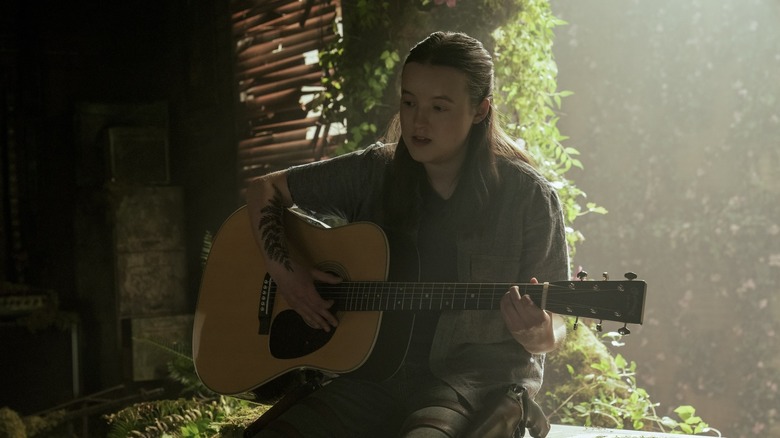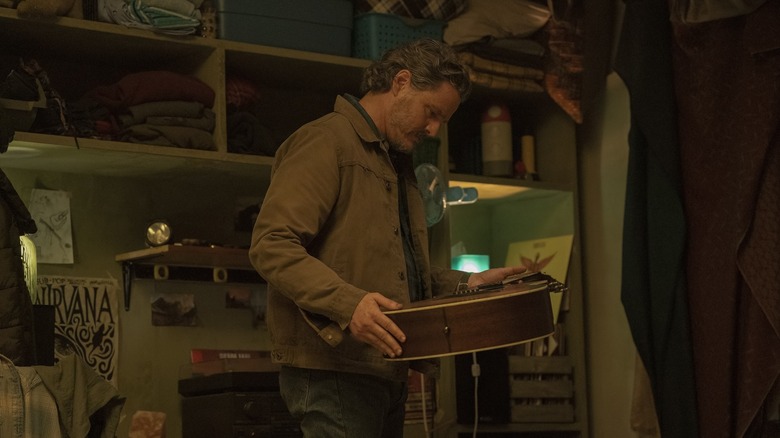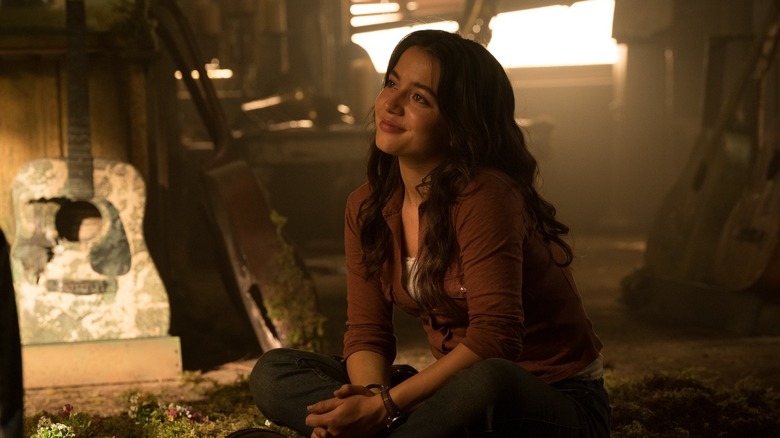What Song Is Ellie Playing In The Last Of Us Season 2 Episode 5?
Music is an important element through both the "Last of Us" video games and the live-action HBO adaptation. Both have a strong style of primary background music, which relies on a lot of acoustic guitar to play into the story's neo-zombie-Western vibe. In addition to the scoring, "The Last of Us" also relies heavily on diegetic music. Joel (Pedro Pascal) plays guitar himself and tells Ellie (Bella Ramsey) in season 1 that he would have liked to have been a singer. In season 2, she's learned to play too after years of learning from him, though the schism in their relationship pushes her away from the instrument.
There are other notable examples, like the use of Linda Ronstadt's "Long Long Time" during the Bill (Nick Offerman) and Frank (Murray Bartlett) episode of season 1, in which the heartbreaker tune serves as both episode title and thematic throughline.
Now that we're getting into the later parts of "The Last of Us" season 2, Ellie has had a couple of guitar moments, first playing an acoustic cover of A-ha's "Take On Me" for Dina (Isabela Merced) in episode 4. In episode 5, she pulls out another guitar in the old theater where they're hiding out in Seattle, but she only gets a few notes in before appearing to be overcome by emotion and setting the instrument back down. Her words are hard to make out if you don't know what you're listening for, but the song she begins to sing is Pearl Jam's "Future Days" — a track with deep significance in the "Last of Us" video games, and now, it seems, in the show as well.
Pearl Jam's Future Days is Joel and Ellie's song
"If I ever were to lose you, I'd surely lose myself." That's the opening line of "Future Days," which Ellie can't seem to get through without thinking of Joel's death and their unresolved tension once again. While we don't know that for sure in the show, it's the case in the games, and it's safe to assume that the song is being used in the same way on HBO. Ellie doesn't try to play it until episode 5, but the song shares its title with the first episode of "The Last of Us" season 2, setting up its importance from the start. The fact that Pearl Jam is from Seattle only makes the song's context in the story more appropriate.
The significance of "Future Days" in the franchise goes all the way back to a live event organized by game developer Naughty Dog and Sony a year after the first game's release, at which key story scenes were acted out by the original actors, underscored by a live orchestra. At the end of the event, game director Neil Druckmann and the cast and crew added a little bonus scene set after the end of the game, featuring "Future Days" as a sort of send-off for Ellie and Joel. Years later, when "The Last of Us Part II" was released, that scene and the song's larger importance became a huge piece of the sequel.
It's a devastating choice given all the future days Joel and Ellie don't get to share together. "Back when I was feeling broken, I focused on a prayer," Eddie Vedder sings in a later verse. "You came deep as any ocean, Did something out there hear?" It's understandable why Druckmann chose this particular song given its relevance for Joel in particular. As Ellie tries and fails to get the words out in Seattle, we understand completely why she's become so fixated on avenging Joel's death.
The use of Future Days in The Last of Us actually doesn't make sense
While "Future Days" is a lovely and lyrically apt song to anchor the story of "The Last of Us," it didn't actually make sense in the video games, and it makes even less sense in the show. Let me explain.
"Future Days" is the final track on Pearl Jam's "Lightning Bolt" album, which they released in October 2013. In the timeline of the games, where the cordyceps outbreak occurs earlier that same year, that made it anachronistic, as the world would have collapsed just before the song actually made it to the airwaves. The HBO series pushes the outbreak up a decade to 2003, making it even more noticeable how temporally inappropriate the song's inclusion is.
Druckmann and series co-creator Craig Mazin addressed this issue on the first episode of HBO's The Last Of Us Podcast season 2 — a necessity in their eyes given the episode sharing the same title as the Pearl Jam song. "That song didn't exist in 2003 when the world ended," Mazin said bluntly on the podcast. "Neil and I had a solid conversation and arrived at the following conclusion: We didn't give a s*** because it is an important song to the story, and thematically, it's incredibly important."
In the grand scheme of things, one song misplaced in time certainly doesn't seem worth getting up in arms about, especially in a story where we've already suspended our disbelief enough to contend with the whole mushroom zombie thing.


